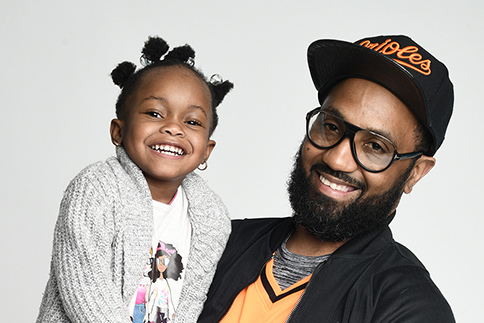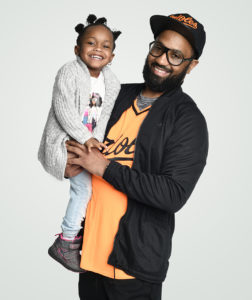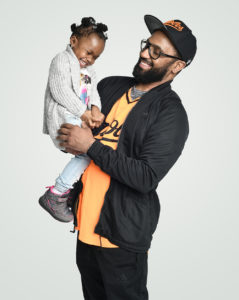
How Santorio Martin Learned to Walk Again—and Began to Soar
Alone in a Baltimore, Maryland hospital room, Santorio Martin had just come out of surgery — previously undiagnosed stage 3 Hodgkin’s lymphoma had devastated his immune system and attacked his spine—when a physician entered the room with a shattering prognosis. “He said, ‘We had to reconstruct your spine. I’m sorry to tell you, you will never walk again,’“ Martin remembers. “I thanked him for what he’d done for me…but he was being hopeless, and I didn’t want to see him again.”
Through months of painful and extensive chemotherapy and rehabilitation, fighting to push his body to walk again, the feelings of fear and loneliness were almost overwhelming. When his phone rang with a number he didn’t recognize, he almost ignored it. But he picked up and the voice on the line was Catherine Pitchford, Director of Programs at the Center for Urban Families (CFUF)— the Baltimore nonprofit where he had completed a 3-week jobs training program months earlier—demanding to know why she hadn’t heard from him. “I told her I had been in the hospital battling cancer and her voice cracked,” Martin says. “‘You did this by yourself?’ she asked me. Then she told me, ‘We are not your kinfolks but we are your family. You are part of our family.’”
 Now, nearly 12 years later, Martin, 45, a construction supervisor at the Whiting-Turner Contracting Company, knows that being part of the CFUF family is a connection that he will never lose—and one that has changed his life and the lives of his six children and fiancé Chauna Brown— forever.
Now, nearly 12 years later, Martin, 45, a construction supervisor at the Whiting-Turner Contracting Company, knows that being part of the CFUF family is a connection that he will never lose—and one that has changed his life and the lives of his six children and fiancé Chauna Brown— forever.
“The Center for Urban Families is for everybody,” says Martin, who manages a team of more than 300 employees and serves as a mentor for CFUF. “It is a networking place for people to get the support they need to to move up in life.”
It’s that understanding and gratitude that makes him feel connected not only to the thousands of men and women helped by the organization, but also to Oprah Winfrey herself, for the support provided to make the work a reality.
“Ms. Winfrey comes from the walk of life,” says Martin. “When she came to Baltimore, she knew it was going to be rough for her, but she had her education and her talent…and she grew to be a beautiful flower. We look up to her. We value her support.”
OUT OF THE DARKNESS
Growing up impoverished in Baltimore, Martin often didn’t know if there would be food at home — or even if there would be a place to go home to. “To me, that was normal,” he says. “I felt unsafe. It felt dangerous.” His father wasn’t around and his mother, he says, was young and was still growing up herself, trying to raise a child and there was much she didn’t know. Still, years of physical, verbal and mental abuse took its toll on him and when his little brother arrived on the scene, he vowed to try to care for him and protect him.
At around age 8 or 9, he remembers his mother leaving the house for several days and him trying to thaw and fry chicken for his little brother so they would have something to eat. When she returned home, she was furious to find that he had cooked in her absence and beat him, he recalls. It was the moment he stood up to her and decided he could no longer live that way. By 14, he had left home, living with relatives, neighbors or a girlfriend’s home.
“I was in the streets, I was hustling,” he says. “It was a way to survive.”
As a grown man, he married and had children — and became involved in a neighborhood fight that escalated into life-threatening violence and ultimately, a man was killed. Though he says he didn’t pull the trigger, Martin went to prison for 11 years on a second degree murder charge.
By the time he was released, he had a child support bill that was more than $30,000 and a criminal history — making it difficult for him to imagine a successful future. His parole officer told him about CFUF.
“It was hard to open up to strangers,” he says. “But they told me to do this program for a couple of weeks and it was going to make a difference.”
That program was STRIVE — a 3-week workshop teaching career skills and networking, providing a solid foundation for building a career. As Martin sat through the eight-hour days, he was hit by desperation and a feeling that none of these classes were going to mean much. He was going through a divorce, he was homeless, he didn’t have a job — and he couldn’t see how the course was going to change any of that. He got out of his seat and walked out of the door — and into founder, president and CEO Joseph T. Jones, Jr.
“I told him, ‘I don’t know how I’m going to get through the rest of the day, I can’t do this,’” Martin remembers. “He looked me in the eye and he said, ‘You finish this program, and you will have a family for the rest of your life.’ He was serious. My plate was full of overwhelming problems, but I thought, ‘Maybe, maybe if I finish this program there will be sunshine on the other side of this hell.’”
A TURNING POINT, SOMEONE WHO KNOWS
Joseph T. Jones, 65, remembers that moment well, facing Santorio Martin in the hallway and looking at the desperation and pain on his face.
“Frustration sometimes looks like anger,” says Jones, a married father of three. “To be able to catch him in that moment before he got out that door, it’s important, it’s strategic, it can be life changing.”
Jones, a former addict who had been in and out of jail thought his own life, founded CFUF in 1999. Since that time, the Center has served over 31,000 Baltimore residents — approximately 1,100 to 1,400 individuals go through programs like STRIVE every year — and continues building outreach through the most vulnerable areas of the city.
“It’s like going to war,” Jones says. “You can take 1,000 soldiers to Iraq and it’s unlikely they will all return home. We are at war in the neighborhoods, on the streets. Fifty one percent of the people we work with have some experience with the criminal justice system.”
Jones was working in the Baltimore health department as part of an initiative to reduce infant mortality in the city, reaching out to women to try to get them the prenatal care they needed when he discovered how needy fathers also were — and how little services they had available to them. “The fathers weren’t even on the radar,” he says. “Helping the pregnant women meant also helping their partners — men who had legal issues, housing issues, employment issues.”
Jones was able to build the nonprofit to help serve more needs of the urban family comprehensively — something that he is intimately connected to because of his own background, growing up in Baltimore with a single, working mother.
His parents split when he was 9 year old and he and his mom moved from the high rise projects of East Baltimore to a different, “less than desirable area,” he says. As his mom went to school and worked jobs to try to support the family, he was often left without the support system he’d had previously. He went from being a Boy Scout and church member to, at age 13, picking up a heroin syringe.
“It took away my mental anguish, it masked all my pain,” he says. Cocaine soon followed and Jones landed in jail by age 14. After that, he was “in and out of jail,” he says until he finally hit a low, kicked out of a management training program for selling drugs on federal property.
“I went into a long term, one year facility to battle my addiction,” he says. “And the judge looked at my strategy and gave me another chance…it wasn’t a second chance for me, it was like a 200th chance and I have never looked back.”
He says that his background gives him the unique ability to understand the stress of living in uncertainty. “I have learned to negotiate the boardroom and the street,” he says. When pulled into social settings by then Vice President Al Gore, who was interested in the work he was doing with fathers in Baltimore, there was a moment when others at the table were comparing Ivy league educations and asking him, “Dr. Jones, where did you go to school,” he recalls. “I’m not a doctor of anything and I went to community college.I could shrink or step into it and embrace it. I embraced it, thinking, ‘I have a seat at this table and I am going to take advantage of it.’ Knowing the street and the boardroom is a gift.”
CHANCE FOR CHANGE
 In March of 2016, Santorio Martin sat down for what he thought was a casual lunch with his CFUF friend Catherine Pitchford when a “scruffy guy in a lumberjack shirt” showed up. “He kept dipping into the conversation, he was real bold,” Martin says, laughing. “I had no idea I was in an interview.”
In March of 2016, Santorio Martin sat down for what he thought was a casual lunch with his CFUF friend Catherine Pitchford when a “scruffy guy in a lumberjack shirt” showed up. “He kept dipping into the conversation, he was real bold,” Martin says, laughing. “I had no idea I was in an interview.”
At the time, Martin was working at a family restaurant as a dishwasher, busboy and delivery man. He had a job, but no career. He listened intently as the stranger talked about the construction business, about benefits and salary, about leadership and being someone who can get things done. By the time lunch was over, Martin rushed to get his resume “powered up,” and two weeks later, he was handed his hardhat as an employee at Whiting—Turner.
“Santorio is a member of the Whiting—Turner family too, so he has several families now,” says Timothy J. Regan, president & CEO of the Whiting—Turner Contracting Company, who grew up in a blue—collar working family in Baltimore. “We are partners with the Center for Urban Families and the team there are incredible people. Joe has created something so powerful in helping people transition their lives.”
Regan and Whiting—Turner became connected to CFUF after Regan heard Jones speaking about the organization in an NPR interview and decided to give him a call.
“We bonded and we decided we could do something together,” he says. “Joe has his own history and he was able to work his way out of it. I’m lucky, but I had tough times growing up and a brother incarcerated for drugs, a father who was an alcoholic. I saw my mother put food stamps on the grocery bill multiple times. It left an indelible mark on me.”
Married for 37 years with three grown children, Regan has spent his career in construction and says it’s important to lift up kids in Baltimore to help them believe in their future. “If you can’t see it,” he says, “You can’t believe it.”
Though other nonprofits like TouchPoint Baltimore, Regan and Jones work with Baltimore youth to help them understand choices they make now can help shape their futures. He also thinks that its important for inner city kids to see a white man like himself interacting with Jones, who is Black, as well as other Black leaders and “to see us hanging out together and loving each other,” he says. “It’s important for them to see.”
USING YOUR GIFTS
Having his own successful career and building a new life with fiancé Chauna Brown isn’t enough for Santorio Martin. He knows that telling his story in a real, raw and vulnerable way can help others behind him and he’s willing to do it, to help them see that there is trust and support in CFUF, a group of strangers that quickly became his family. The bond is so tight that founder Joe Jones is set to be Martin’s best man when he and Chauna tie the knot in 2022 —and Joe has asked the couple to serve as mentors to other couples who need support at CFUF. Martin’s boss at Whiting-Turner, Tim Regan, is also set to be at Martin’s upcoming nuptials.
“We are so grateful to the Foundation that they reach out and identify powerful organizations like CFUF doing such important work on the ground, one person at a time,” Regan says. “That is where it happens.”
Jones agrees. “Years ago there was a young black girl, Ms. Winfrey, who got an opportunity with a relatively small job at a local television station and today she is a billionaire. People saw something in her and gave her support. What she has been able to do with her platform and celebrity is to not only raise the consciousness of America on some of these things but to create real opportunity in communities like Baltimore by making these assets available to us to reinvest in this community. We are doing what Ms. Winfrey has done with her philanthropy in a microcosm that connects the Tim Regans with the Santorio Martins of the world.
This is the kind of support that it takes…to turn around urban communities.”
For Martin, he knows that loving his family, being there for his kids, reminding them of where they came from and what they can become is part of the journey. He has served as a mentor for others in the CFUF program, including two of his cousins, and believes that it’s something that continues to bring success to people once hopeless.
“My goal for the program is for me to get as many people as I can from my neighborhood where I come from to see a bigger picture,” Martin says. “I give it to my kids and the kids in my neighborhood. Our neighborhood, the one I grew up in and where I lived as an adult, had trees and flower pots and was a beautiful place. Now the neighborhood looks like bombs blew up in it.
“I will never forget where I came from. I give those same conversations to my kids about where we come from, and where we are today. They know my story.”
It’s a message that Martin is committed to living.
“You’ve got to believe in me,” he says. “If I can make a change in life, you can do it.”

